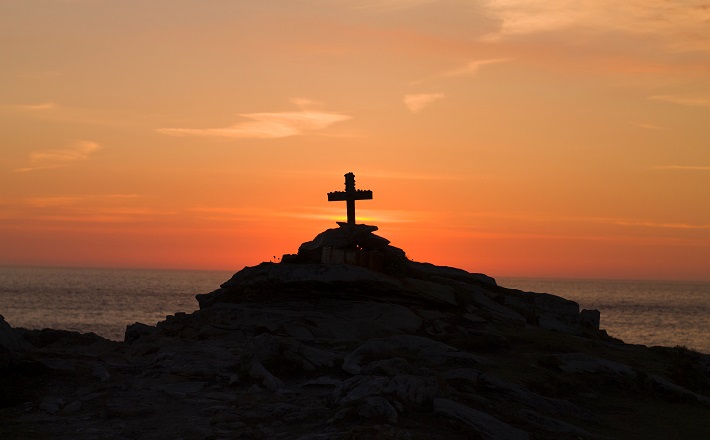Commentary on Psalm 118:1-2, 14-24
I cannot read this psalm without singing it.
If you have a favorite sung version of the psalm, start by singing it, and then turn to interpretation. For me, it is the monks of Mepkin Abbey singing exultantly, at a fast clip, in a roar of voices. To belabor the obvious, songs are meant to be sung. Sing first—offer these words from God back to God in doxology. Then interpret. The order of things is important.
To read the Bible well, you have to keep flipping backwards. Christians tend to get stuck in the New Testament—evangelicals typically in John or Paul, mainline liberals in the Synoptic Gospels. But the New Testament is merely a reader’s guide to the Old. Hardly a word can be understood without flipping back. This psalm shows us how to read the Bible. It is a song of victory. Jesus embodies this psalm of victory with his triumphal entry (118:19-20, 26). Other New Testament writers describe all of salvation with a glance at this psalm—the stone the builders rejected has become the cornerstone (118:22). But, of course, a glance back at Psalm 118 is not back nearly far enough yet. We keep reading backwards all the way to the shores of the sea, the women singing in triumph, the Egyptian horses and chariots cast aside, Israelite slaves liberated. The tang of salt on their lips, nothing but dry dust on the bottoms of their feet, they haul out tambourines and recount God’s deeds of glory (Exodus 14-15). Any trip into Exodus recalls God’s grace in creation as well—the one who frees slaves also . Side glances to Isaiah and Ezra are appropriate as well (Isaiah 25:6-8, Ezra 3:11). The Bible is a book of praise from back to front. Once you wander in there, you keep going deeper. How can we keep from singing?
This psalm may have had its origin as a song of gratitude for deliverance from a tight spot. Literally. I remember a children’s book I read once where the protagonist was a spelunker who got caught in a cave. His arms were wedged against his body, he could not go forward and could not go back. His only hope was for someone else to appear and pull him out from behind, where he’d come from. My chest tightens now to think of it (why do we read these things to children?!). It is a dilemma from which there is no self-initiated escape. The only deliverance can come from outside, elsewhere, by another agent. For the psalmist, that deliverance has come. The only response can be gratitude. In fact, the psalmist all but insists that all others join in the thanksgiving. The children of Israel, that is, all the chosen (118:2). The children of Aaron, that is, the priests leading the people in worship (118:3). All who fear the Lord—that is, those beyond the chosen who admire Israel and her God (118:4). Let all the earth rejoice. For God has shown divine hesed once more—that is, divine tenacity, clinging to the covenant even as Israel clings to other would-be sources of hope, refuses to let go of a world that refuses to be embraced. Rejoice. That steadfast love is unending.
The reversal of fortune the psalmist describes is nothing short of a war victory. Think of the ongoing remembrance of victory in World War II in Allied nations, especially as the last of those veterans die off. We still cheer to camera footage of celebrations in the streets. Who doesn’t love a victory? But as American basketball coach Bobby Knight liked to say (a dubious source for a quote in a biblical commentary, I grant, but bear with me): everyone wants to win. Not everyone wants to do what is necessary to win. Israel bargains with God often. That’s what prayer is. And in those bargains, Israel can be a little manipulative. The bargaining goes like this: God, I’m in trouble, near death. You like praise, in fact, you love it. If you let me live, I will praise you. You will get what you want: praise. I will get what I want: life. This is a win/win God, can we not make this happen? The deal has been struck in Psalm 118, and now the psalmist recounts the Lord’s saving ways (118:17).
But there is a further step in this psalm, a step into frail flesh and blood. One Old Testament scholar calls verses 19-27 “the festival of the saved,” a title upon which it would be hard to improve.1 Orthodox Christians recite this psalm during the Paschal liturgy on Holy Saturday Eve. A priest will stand outside the door of the church and demand entry. As he knocks, we can hear Christ himself battering down the gates of hell, and lifting out Adam and Eve. There is no refuge from Christ’s grace if he will storm the very gates of the netherworld to save. The church’s memory of Jesus’ entry into the gates of Jerusalem is with this psalm. He bumps along on a humble donkey, acclaimed by children, not an obvious war hero, but a religious fool, bound for his doom. The Lord’s “valiance,” celebrated in some of these verses, is understood strangely—as a punishment so severe it is a giving over to death (verses 17-18). But precisely this is God’s strange way of saving Israel and so the world. The stone we reject, God places at the cornerstone, building the entire temple upon it (118:22).
I started by arguing that to read the Bible well, we have to flip back. Of course, we must also flip forward. Christ’s saving work among us is complete, but it is not consummated. He has yet more work to do. One day he will enter the gates of holiness anew. He will have in his train all his strangest and most unlikely friends—the poor, children, those not seen or noticed or loved in this age. And maybe, by the gritty grace of God, he will bear us also in his procession of the preposterous. Who knows? Stranger things have happened—as a church gathering on Easter knows.
Notes:
- Frank-Lothar Hossfeld and Erich Zenger. Psalms 3. (Minneapolis: Fortress, 2011), 230.


April 12, 2020